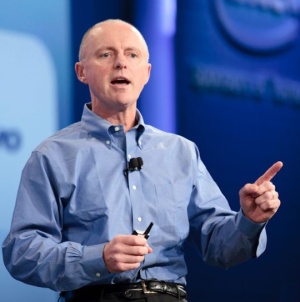Intel outlines 'ultrabook' device category

Intel has detailed a new category of slimline laptops called 'ultrabooks', which it said combines best-in-class performance with improved responsiveness and security, while detailing its Atom processor roadmap for the upcoming year.

Intel vice president Sean Maloney has introduced the company's vision of the 'ultrabook'. Photo credit: Stephen Shankland/CNET News
Intel vice president Sean Maloney took to the stage at Computex 2011 in Taipei on Monday to introduce the company's new vision of the ultrabook — ultra-thin and light devices with "tablet-like" features. Maloney predicted ultrabooks will account for 40 percent of all laptops sold by the end of 2012.
"These computers will marry the performance and capabilities of today's laptops with tablet-like features and deliver a highly responsive and secure experience, in a thin, light and elegant design," Maloney said. "The ultrabook will be shaped by Moore's Law and silicon technology in the same way they have shaped the traditional PC for the past 40 years."
Initially, the ultrabook class of products will use second-generation Core processors, Intel said. The devices will measure less than 20mm thick and will have a price tag of under $1,000 (£605). Similarly styled machines such as the MacBook Air and Samsung Series 9 laptops both feature an ultrathin profile, but command a higher retail price.
One of the first devices to ship under the trademarked ultrabook banner is the Asus UX21, which also launched on Monday.
"In terms of the form factor, the ultrabook is not a new category as there have been similar ultraportable mobile PCs available, such as the MacBook Air," Tracy Tsai, principal research analyst at Gartner, told ZDNet UK on Tuesday. "In 2009 and 2010, Intel had also promoted Ultra Low Voltage (ULV) CPUs, for thin and light notebooks, except ultrabooks are much thinner, lighter, with faster response time [with 'Instant-On' technology], longer battery lives, and with mainstream pricing."
Tsai added that ultrabooks' fast booting technology could lead to them replacing smartphones and tablets for some tasks.
Ivy Bridge
Following Sandy Bridge, ultrabook hardware will use 'Ivy Bridge', the next generation of Intel processor. The 22-nanometer Ivy Bridge platform will provide the first chips to use Intel's 3D transistor Tri-Gate technology, introduced in May. The company said it expects Ivy Bridge-based devices to be available in the first half of 2012.
Intel said the successor to Ivy Bridge, due for 2013, will be Haswell. It added that the move to Haswell will reduce the thermal design power of the company's chips by 50 percent.
Maloney also gave details of the company's Atom processor-based smartphone and tablet platform plans, including the 32-nanometer Medfield platform.
Medfield has been optimised to be a low-power, high-performance chip capable of handling advanced media, gaming and graphical tasks, Intel said. Medfield will go into production "later this year" and will enable sub-9mm tablet designs to make it to market by the first half of 2012. It will support multiple operating systems including Android and MeeGo, the company added.
Maloney also talked about Intel's 32-nanometer Cedar Trail notebook platform. Cedar Trail contains Intel's Rapid Start and Smart Connect Technology, which allows devices to stay updated even when on standby. It also features Intel Wireless Display and PC Synch technology, allowing users to update and synchronise documents and other files across multiple devices. Battery life for Cedar Trail devices is expected to be around 10 hours, or "weeks" on standby, Intel said.
Intel's development of the Atom processor will outpace Moore's Law, moving from 32-nanometer, through 22-nanometer to 14-nanometer designs within three successive years, Maloney added.
Get the latest technology news and analysis, blogs and reviews delivered directly to your inbox with ZDNet UK's newsletters.